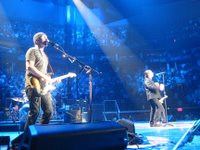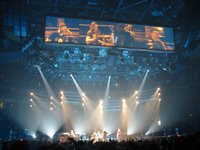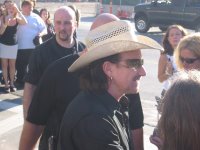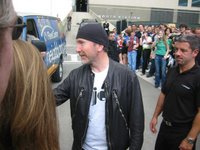U2: The Band from The Emerald Isle

U2 plays Boston: October, 2005

Now that I’m a newly-minted Irish citizen, I’ll proudly proclaim being a fan of Dublin-based U2. This isn’t a place to talk about the band, because chapter and verse has been written about Bono, Edge, Larry Mullen Jr. and Adam Clayton since they released their first album, ‘Boy,’ in 1980. I took a liking to U2 right from the start, and they’ve gotten bigger and (mostly) better over the decades.
U2 came along in the early 1980s, at about the time when ‘punk’ was in full swing. I never latched onto punk rock, because (to me) it was a whole lot more noise and anger than it was music. Although U2 floated in with the punk tide they quickly forged a unique sound and presence that appealed to me. ‘Boy’ drew much acclaim from the music press, and their shows in New York, Chicago, and Boston—big Irish cities all—were always packed. The band toured these and other cities, playing college campuses and little clubs (The Paradise in Boston is fondly remembered by Bono). The crowds were small, but U2 played large. So large, in fact, that U2’s acclaim grew mostly as a result of their legendary live shows. Boston’s WBCN had a DJ by the name of Carter Alan, and he was immediately taken by the energy and power of U2’s live show. At every opportunity, Alan would extol the virtues of Dublin’s new export. “You’ve got to see this band!” he’d exclaim. Alan was a U2 apostle, and the band credits him for their early success in America.
A few basic qualities drew me to U2. First, the band members are Irish. That by itself means nothing, but U2 knew that to reach the top perch in popular music they'd have to work hard and work honest. The landscape is littered with rock bands that could manage neither. In the end, the Irish have been known as hard, dedicated workers. Indeed, while none of the band members were really ‘trained’ musicians, they eventually comprised the biggest and most popular band on the planet…by far. They knew that being one quarter of U2 meant more than being one hundred percent of something else. Individuality—going off on solo careers, for example—took a back seat. Second, none of the members of U2 wear the label ‘Rock Star’ on their sleeves. There’s enough of that out there, thank you very much. Third, the whole U2 organization is exceptionally well run. Supporting the four members of the band is Principle Management, led by manager Paul McGuiness. From top to bottom, they are as sharp as they come. In the same way that Disney is more than just the Magic Kingdom, U2 is more than just Bono and his three mates.
In U2’s very first single from 1980 (‘I Will Follow’) I could hear things I never heard before. Bono’s voice had urgency, Edge’s chiming guitar was magic, the Glockenspiel was fresh, Larry Mullen’s drums were steady, and Adam Clayton’s bass was thunderous. I immediately liked U2, and knew that I’d eventually want to see them play live. That chance came in 1983 at The Worcester Centrum in Worcester, Massachusetts. This show has the distinction of being U2’s very first arena show, since up to that point the band had been playing college campuses and small clubs. Although several years from capturing widespread acclaim and popularity, U2 still sold out The Worcester Centrum in 1983. With a rather thin catalog of music, U2 closed the show with a true encore…a song played for a second time. But the band raised the roof from their first note to their last at this show, and it wasn’t long before simple momentum—and good management—propelled them to superstardom.
Over the years I’ve seen U2 play several times in and around the Boston area. I’ve seen them in Worcester, in Foxborough, and in Boston. I’ve even seen them in Tacoma. And while the shows themselves have always been magnificent, there’s something else that makes U2 stand head-and-shoulders above all other bands: they stay connected with their fans.
About five hours before the band takes the stage in front of 20,000 or 200,000 people, the members of U2 arrive at the venue for a sound check. It’s their way of making sure the arena or stadium has been sound-engineered for that night’s show. The band leaves nothing to chance, so if they’re playing Boston’s TD Banknorth Garden for a four-night engagement you’ll see U2 arrive at the arena each afternoon at around 4pm. Hard-core fans know the drill, and we all assemble at the point where the entourage enters the arena.
Last year, on two different occasions, I was there to greet the members of U2 when they arrived at the Boston arena. Boston is one of U2’s favorite cities, and they love chatting with fans there. I was lucky enough to chat with guitarist The Edge—a soft-spoken, intelligent Dubliner responsible for U2’s signature sound. Then Bono came out to hold babies, sign autographs, wave to passing Duck Tour boats, and generally hold court. Adam Clayton—the bassist, and probably even more soft-spoken than Edge—came out and did the same. Only Larry Mullen Jr—the drummer—failed to make an appearance. Larry actually founded U2 while at high school in Dublin back in the late 1970s. But being founder means nothing to Larry. He’s the shyest of the bunch, and he’ll usually politely wave to his fans from his SUV and head into the arena.

Bono greets fans in Boston...October, 2005

Adam Clayton, bass player

The Edge, guitar

Ticket autographed by Bono, The Edge, and Adam Clayton
There are probably plenty of people who either don’t like U2 or don’t care about them. But that’s fine with me. Art is a very individual thing. In the same way that I’ll never try to ‘convince’ someone to like U2, I don’t want people trying to convince me to like a particular TV show or book or movie. It just doesn’t work that way. But I’m proud to be one of those card-carrying U2 fans that can say they were there from the start!

